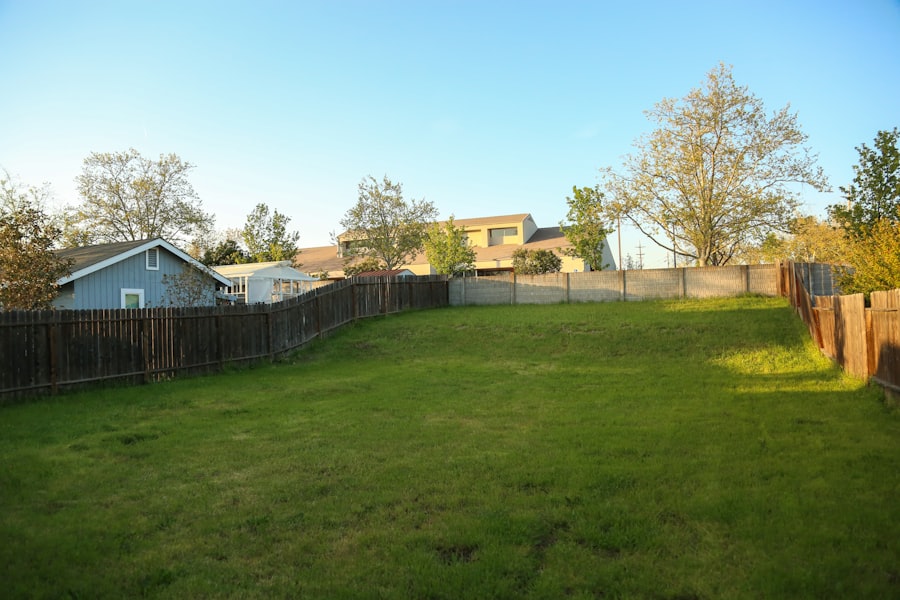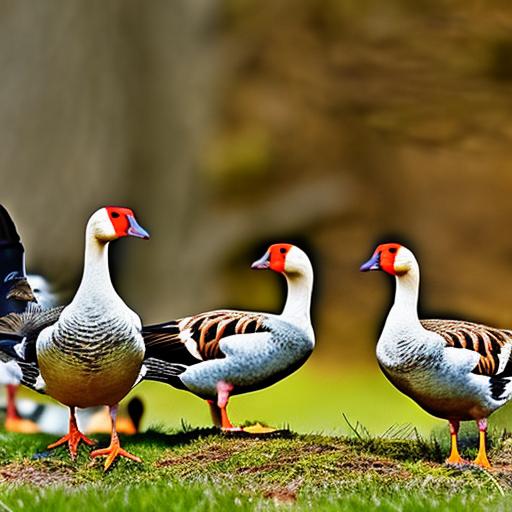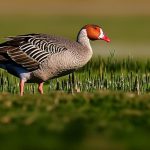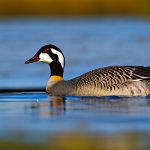Geese can be a nuisance for homeowners, leaving behind droppings and damaging lawns and gardens. These large birds are attracted to open spaces with easy access to water and food, making residential yards an ideal location for them to settle. While geese may seem harmless, their constant grazing and trampling can cause significant damage to lawns and gardens. Additionally, their droppings can be unsightly and pose health risks to humans and pets. Therefore, it is important for homeowners to find effective methods for keeping geese away from their yards.
Key Takeaways
- Geese can cause damage to your yard and pose health risks to humans.
- Understanding geese behavior and habits can help in finding effective solutions.
- Natural methods like landscaping and decoys can help keep geese away.
- Physical barriers like fences and netting can also be effective.
- Using sound and light, repellents, and trained dogs can also deter geese.
Understanding the behavior and habits of geese
In order to effectively deter geese from your yard, it is important to understand their behavior and habits. Geese are social animals that mate for life and return to the same nesting sites each year. They are highly adaptable and can thrive in a variety of environments, including urban areas. Geese are attracted to open spaces with easy access to water and food, such as residential yards with ponds or lakes nearby. They are also attracted to areas with short grass, as it provides them with easy grazing opportunities.
The negative impact of geese on your yard
Geese can cause significant damage to lawns and gardens with their constant grazing and trampling. Their feeding habits can result in patches of dead or damaged grass, making the yard look unsightly. Additionally, their droppings can be a major issue. Not only are they unsightly, but they can also pose health risks to humans and pets. Geese droppings can contain harmful bacteria such as E.coli and Salmonella, which can cause illness if ingested. Therefore, it is important for homeowners to find effective methods for keeping geese away from their yards.
Natural methods for keeping geese away
There are several natural methods that homeowners can use to deter geese from their yards. One effective method is to plant tall grasses and shrubs around the perimeter of the yard. This creates a natural barrier that geese are less likely to cross. Geese prefer open spaces with easy access to food, so planting tall grasses and shrubs can make your yard less appealing to them. Another natural method is to add decoys of natural predators, such as coyotes or owls, to your yard. Geese are wary of predators and will be less likely to settle in an area where they feel threatened.
Installing physical barriers to deter geese
Physical barriers can be an effective way to keep geese out of certain areas of your yard. Fencing or netting can be installed around ponds or gardens to prevent geese from accessing these areas. It is important to ensure that the fencing or netting is tall enough and secure enough to prevent geese from flying over or walking through it. Floating barriers can also be used in ponds or lakes to prevent geese from accessing the water. These barriers create a physical barrier that geese are unable to cross, forcing them to find another location.
Using sound and light to scare off geese

Another effective method for deterring geese is to use sound and light to scare them away. Loud noises, such as air horns or banging pots and pans, can startle geese and encourage them to leave. Flashing lights or lasers can also be effective in scaring off geese. These methods work by creating a sense of danger or threat, causing the geese to flee the area. It is important to note that these methods may need to be used consistently in order to maintain their effectiveness.
Repellents and deterrents for geese
There are several chemical repellents and deterrents available that can help keep geese away from your yard. One common chemical repellent is methyl anthranilate, which can be sprayed on grass and plants to make them less appealing to geese. This chemical is safe for humans and pets, but it is important to follow the instructions carefully when using it. Another option is to use motion-activated sprinklers. These sprinklers are triggered by movement and can be used to deter geese from certain areas of your yard. The sudden burst of water startles the geese and encourages them to leave.
The benefits of having a trained dog to keep geese away
One effective long-term solution for keeping geese away from your yard is to have a trained dog. Dogs can be trained to chase geese away without harming them. The presence of a dog in the yard can deter geese from settling in the area, as they see the dog as a potential threat. Dogs are also able to patrol the yard and chase away any geese that may try to settle. This provides a long-term solution for keeping geese away from your yard.
Working with your community to manage geese populations
Managing geese populations in your area requires a collaborative effort. Contacting local wildlife authorities or community organizations can help in managing geese populations in your area. These organizations may have programs in place to control geese populations through egg addling or relocation. Additionally, encouraging neighbors to use similar methods for keeping geese away can also be effective. If multiple homeowners in the area are using deterrents and repellents, it can create a less appealing environment for geese.
Conclusion and ongoing maintenance for keeping geese away from your yard
In conclusion, there are many methods available for keeping geese away from your yard. It is important to understand the behavior and habits of geese in order to effectively deter them. Natural methods such as planting tall grasses and shrubs, as well as using decoys of natural predators, can be effective in keeping geese away. Physical barriers, sound and light deterrents, and chemical repellents can also be used to deter geese. Having a trained dog can provide a long-term solution for keeping geese away. It is important to regularly check and maintain these methods in order to ensure their effectiveness. By working with your community and implementing these methods, you can successfully keep geese away from your yard.
If you’re looking for effective ways to keep geese away from your yard, you might also be interested in learning about the benefits of having a chicken coop. Not only can a chicken coop provide you with fresh eggs, but it can also help deter geese from invading your property. Check out this informative article on poultrywizard.com that discusses the advantages of having a chicken coop in Portage. By implementing some of the strategies mentioned in this article, you can create a more goose-free environment while enjoying the perks of raising chickens.
FAQs
What are some effective ways to keep geese away from my yard?
There are several effective ways to keep geese away from your yard, including using decoys, installing fencing, using repellents, and modifying your landscaping.
What types of decoys can I use to keep geese away?
You can use a variety of decoys to keep geese away, including fake predators like owls or coyotes, or even fake geese.
What kind of fencing is best for keeping geese out of my yard?
A fence that is at least 3-4 feet tall and has small mesh or wire spacing is best for keeping geese out of your yard.
What types of repellents can I use to keep geese away?
There are several types of repellents you can use to keep geese away, including visual repellents like reflective tape or scare balloons, as well as auditory repellents like noise makers or ultrasonic devices.
How can I modify my landscaping to keep geese away?
You can modify your landscaping by removing any sources of food or water that may attract geese, as well as planting vegetation that geese do not like to eat, such as prickly or thorny plants.
Meet Walter, the feathered-friend fanatic of Florida! Nestled in the sunshine state, Walter struts through life with his feathered companions, clucking his way to happiness. With a coop that’s fancier than a five-star hotel, he’s the Don Juan of the chicken world. When he’s not teaching his hens to do the cha-cha, you’ll find him in a heated debate with his prized rooster, Sir Clucks-a-Lot. Walter’s poultry passion is no yolk; he’s the sunny-side-up guy you never knew you needed in your flock of friends!







